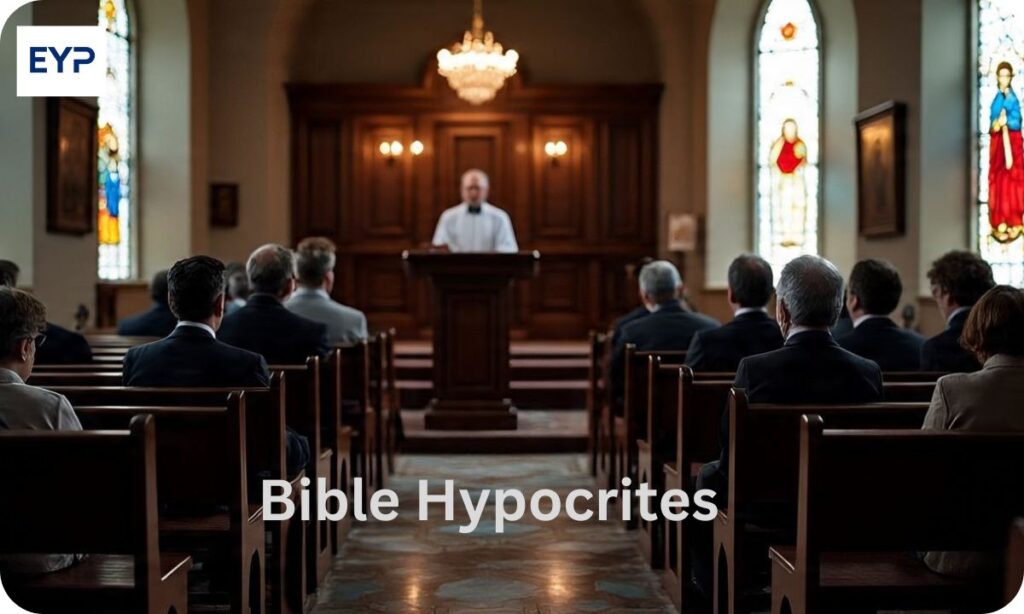Bible verses about hypocrites reveal the dangers of pretending to be righteous while hiding sin and deceit in the heart. Jesus warns that those who honor God with their lips but have hearts far from Him are hypocrites (Matthew 15:7-9). Isaiah calls out empty worship that ignores justice and mercy (Isaiah 1:13-17).
James teaches that true religion controls the tongue and shows itself in actions, not just words (James 1:26). Paul warns about those who have a form of godliness but deny its power (2 Timothy 3:5). These verses challenge us to live with sincerity, humility, and genuine faith.
Hypocrisy in the Old Testament
1. Isaiah 29:13
“These people come near to me with their mouths and honor me with their lips, but their hearts are far from me…”
- Lip Service vs. Heart Devotion – God condemns outward expressions of worship that do not reflect genuine inner devotion.
- False Piety – The verse highlights the danger of maintaining religious traditions without true spiritual engagement.
- Spiritual Disconnect – This reveals a gap between human religiosity and divine expectation, a hallmark of hypocrisy.
2. Jeremiah 7:9-10
“‘Will you steal and murder… and then come and stand before me in this house…?’”
- Moral Contradiction – The people commit grievous sins but still presume they are safe in God’s temple.
- Religious Presumption – They treat worship as a protective charm rather than a call to righteousness.
- Divine Disapproval – God exposes the hypocrisy of using His temple as a cover for evil behavior.
3. Ezekiel 33:31
“They listen to your words but do not put them into practice…”
- Empty Enthusiasm – The people appear eager to hear God’s word but have no intention of obeying it.
- False Admiration – They speak well of the prophet but do not internalize the message.
- Disobedient Hearts – This verse highlights a form of hypocrisy rooted in insincere discipleship.
4. Amos 5:21-24
“I hate, I despise your religious festivals… Let justice roll on like a river…”
- God Rejects Empty Rituals – Worship without justice and righteousness is not only ineffective but detestable to God.
- Justice Over Ceremony – God values ethical living far more than religious observance.
- Call to Authentic Faith – True devotion is marked by social justice, not ritual alone.
5. Micah 3:11
“Her leaders judge for a bribe… yet they lean on the Lord…”
- Corrupt Leadership – Leaders practice injustice while claiming divine protection.
- Religious Hypocrisy – There’s a false confidence that God will bless them despite their corruption.
- False Security – The verse condemns those who exploit others yet invoke God’s name for legitimacy.
6. Proverbs 11:9
“With their mouths the godless destroy their neighbors, but through knowledge the righteous escape.”
- Deceptive Speech – Hypocrites use words to harm, even while appearing respectable.
- Moral Contrast – The righteous are guided by truth, unlike the double-tongued hypocrite.
- Power of Integrity – Knowledge and sincerity protect the faithful from the destructiveness of hypocrisy.
7. Psalm 50:16-17
“But to the wicked person, God says: ‘What right have you to recite my laws…'”
- Moral Inconsistency – Speaking God’s laws while rejecting them is exposed as pure hypocrisy.
- Divine Confrontation – God challenges the audacity of those who teach righteousness but live sinfully.
- Rejection of Authority – Hypocrites despise God’s discipline even while quoting His Word.
8. Job 8:13
“Such is the destiny of all who forget God; so perishes the hope of the godless.”
- False Hope – Hypocrites appear religious but are ultimately without foundation.
- Judgment for Forgetfulness – To forget God while claiming to serve Him is hypocritical and doomed.
- God Sees Through Facades – Outward religiosity without genuine faith is futile.
9. Zechariah 7:5-6
“Was it really for me that you fasted…?”
- Self-Centered Worship – God questions the sincerity of rituals performed with selfish motives.
- Misguided Fasting – Fasting that doesn’t reflect true repentance is empty.
- True Intention Matters – God values motive over ritual; hypocrisy stems from self-interest.
10. Malachi 1:6-8
“You offer defiled food on my altar… Try offering them to your governor!”
- Dishonoring Worship – Offering blemished sacrifices shows contempt for God’s holiness.
- Double Standards – The people treat God with less respect than earthly authorities.
- Religious Pretense – The act of sacrifice is hypocritical when the heart is careless and irreverent.
Hypocrisy Condemned by Jesus

1. Matthew 6:1-2
“Be careful not to practice your righteousness in front of others to be seen by them…”
- Motives Matter – Public acts of righteousness lose spiritual value when done for human praise.
- False Piety – Hypocrites seek applause, not God’s approval, turning devotion into performance.
- Loss of Reward – Earthly recognition becomes their only reward, not God’s commendation.
2. Matthew 7:3-5
“Why do you look at the speck of sawdust in your brother’s eye…”
- Self-Blindness – Hypocrites criticize others while ignoring their own greater faults.
- Moral Inconsistency – Jesus exposes the double standard in judging others harshly.
- Call to Self-Examination – True righteousness requires humility and personal repentance before correcting others.
3. Matthew 15:7-9
“These people honor me with their lips, but their hearts are far from me…”
- Heart vs. Lips – Outward worship is worthless when the heart is disconnected from God.
- Man-Made Religion – Traditions can become tools of hypocrisy when they replace God’s commands.
- Empty Worship – Jesus calls out religious rituals that lack genuine devotion as futile.
4. Matthew 23:27-28
“You are like whitewashed tombs… beautiful on the outside but full of dead bones…”
- Deceptive Appearance – Hypocrites look righteous externally but are spiritually corrupt within.
- Spiritual Death – Outward holiness masks inward decay and sin.
- God Sees the Heart – Jesus emphasizes inward purity over religious image.
5. Luke 12:1
“Beware of the yeast of the Pharisees, which is hypocrisy.”
- Infectious Influence – Hypocrisy spreads subtly, like yeast in dough.
- Warning Against Pharisees – Their religious behavior masked corruption and pride.
- Call to Authenticity – Jesus urges vigilance against insincerity in faith and conduct.
6. Mark 7:6
“These people honor me with their lips, but their hearts are far from me.”
- Superficial Faith – Words and rituals mean nothing without heartfelt devotion.
- Repetition of Isaiah’s Warning – Jesus applies Isaiah 29:13 to His own generation.
- Religious Pretense – He condemns substituting tradition for true obedience.
7. Luke 6:42
“First take the plank out of your eye…”
- Personal Accountability – Correcting others begins with confronting one’s own faults.
- Hypocrisy in Judgment – Jesus rebukes those who condemn others while ignoring personal sin.
- Restoration with Integrity – Only the humble and self-aware can help others spiritually.
8. Matthew 23:25
“You clean the outside of the cup… but inside are greed and self-indulgence.”
- External vs. Internal – True purity must begin within, not just with appearances.
- Moral Corruption – Hypocrites conceal sin behind religious behavior.
- Call to Inner Cleansing – Jesus demands transformation of the heart, not just ritual behavior.
9. Matthew 23:13
“You shut the door of the kingdom… you yourselves do not enter…”
- Religious Gatekeeping – Hypocrites block others from finding truth while rejecting it themselves.
- Abuse of Authority – Jesus exposes the Pharisees’ misuse of spiritual leadership.
- Spiritual Hypocrisy – Claiming to represent God while hindering others is a grave sin.
10. Matthew 23:15
“You travel over land and sea to win a single convert… and make them twice as much a child of hell as you are.”
- False Evangelism – Hypocrites convert others not to truth, but to their own corruption.
- Misguided Zeal – Religious passion without truth leads others deeper into error.
- Multiplying Hypocrisy – Jesus warns of the dangerous ripple effect of insincere religion.
Hypocrisy in Actions and Words
1. James 1:26
“If anyone considers himself religious and yet does not keep a tight rein on his tongue, he deceives himself…”
- Self-Deception – Claiming religion without controlling one’s speech is hypocrisy.
- Faith and Behavior – True religion is shown in conduct, not just belief.
- Tongue as a Test – Speech reveals the authenticity of one’s faith.
2. James 2:14-17
“Faith without deeds is dead.”
- Faith Must Be Active – Hypocrisy appears when faith isn’t demonstrated through actions.
- Empty Faith – Mere belief without loving works is ineffective and false.
- Faith and Works Unite – Genuine faith naturally produces good deeds.
3. 1 John 4:20
“Whoever claims to love God yet hates a brother or sister is a liar.”
- Inconsistent Love – Claiming love for God but hating others exposes hypocrisy.
- Love as Proof – Love for others authenticates one’s relationship with God.
- Integrity of Faith – True faith is visible in loving relationships.
4. 1 Peter 2:1
“Rid yourselves of all malice and deceit, hypocrisy, envy, and slander…”
- Call to Purity – Christians must reject hypocrisy as part of spiritual growth.
- Sin’s Root – Hypocrisy is linked with deceit and envy, toxic to the community.
- Transformation Needed – Authentic faith requires putting away falsehood.
5. Titus 1:16
“They claim to know God, but by their actions they deny him…”
- Claim vs. Reality – Saying one knows God without righteous deeds is hypocritical.
- Denial Through Actions – Hypocrisy is not just words but living contrary to faith.
- Judgment on False Professors – Such behavior is condemned as inconsistent with true faith.
6. Romans 2:3
“Do you suppose God’s kindness is meant to lead you to repentance? But because of your stubbornness and unrepentant heart, you are storing up wrath…”
- Judging Others – Hypocrites condemn others while refusing to repent themselves.
- Hard-Heartedness – Stubbornness blocks true repentance and invites judgment.
- God’s Kindness Misused – Misunderstanding grace as a license for sin reveals hypocrisy.
7. Galatians 6:3
“If anyone thinks they are something when they are not, they deceive themselves.”
- False Pride – Hypocrisy arises from inflated self-importance.
- Self-Deception – Believing oneself better than reality leads to spiritual blindness.
- Humility Required – Genuine faith demands honest self-assessment.
8. Colossians 3:9
“Do not lie to each other, since you have taken off your old self with its practices.”
- Lying as Hypocrisy – Dishonesty contradicts the new life in Christ.
- Renewal of Character – Faith calls for shedding old deceitful habits.
- Community Integrity – Truthfulness is essential for authentic Christian fellowship.
9. 1 Timothy 4:2
“They will speak lies in hypocrisy, their consciences seared as with a hot iron.”
- Deliberate Falsehood – Hypocrites knowingly spread lies.
- Seared Conscience – Repeated hypocrisy dulls moral sensitivity.
- Dangerous Deception – Such people mislead others and resist repentance.
10. 2 Corinthians 11:13-15
“Such people are false apostles… masquerading as apostles of Christ.”
- Deceptive Appearance – Hypocrites can appear as genuine servants of God.
- Satan’s Masquerade – Evil forces disguise themselves as good, causing confusion.
- Discernment Needed – Believers must be vigilant against spiritual hypocrisy.
Hypocrisy in the Church
1. 1 Corinthians 5:11
“Do not associate with anyone who claims to be a brother or sister but is sexually immoral… or a swindler—do not even eat with them.”
- Call to Accountability – Hypocrisy involves claiming faith but living in blatant sin.
- Church Discipline – The community must avoid enabling hypocritical behavior.
- Integrity in Fellowship – True faith demands a consistent lifestyle with professed beliefs.
2. Galatians 2:13
“Even Barnabas was led astray by their hypocrisy.”
- Power of Hypocrisy – Even respected believers can be deceived by hypocritical actions.
- Community Impact – Hypocrisy can mislead and cause division in the church.
- Call to Watchfulness – Believers must guard against subtle inconsistencies in conduct.
3. 1 Corinthians 6:9-10
“Neither the sexually immoral nor thieves… will inherit the kingdom of God.”
- Warning Against Sin – Persistent sinful behavior contradicts true faith.
- Exclusion of Hypocrisy – Claiming to follow Christ while living immorally is invalid.
- Call to Repentance – Transformation is essential for entering God’s kingdom.
4. 2 Timothy 3:5
“Having a form of godliness but denying its power. Have nothing to do with them.”
- Empty Religion – Hypocrisy is shown by outward religiosity without spiritual power.
- Danger of False Believers – Such people deceive others but lack true faith.
- Separation Required – Believers should avoid hypocrites who resist genuine transformation.
5. James 3:17
“But the wisdom that comes from heaven is first of all pure; then peace-loving, considerate…”
- Characteristics of True Faith – Authentic spirituality produces purity and humility.
- Contrast to Hypocrisy – Hypocrisy lacks these qualities and fosters division.
- Wisdom as Evidence – True wisdom validates genuine faith and behavior.
6. Romans 12:9
“Love must be sincere. Hate what is evil; cling to what is good.”
- Sincerity in Love – Hypocritical love is insincere and self-serving.
- Moral Clarity – Genuine faith requires rejecting evil and embracing goodness.
- Foundation for Christian Life – Sincere love underpins authentic community.
7. 1 Peter 1:22
“Now that you have purified yourselves by obeying the truth… love one another deeply…”
- Obedience and Purification – True faith leads to moral cleansing and sincere love.
- Love as a Marker – Genuine believers demonstrate deep, sincere affection.
- Connection Between Truth and Love – Hypocrisy is absent where truth shapes relationships.
8. Hebrews 10:22
“Let us draw near to God with a sincere heart and with full assurance…”
- Sincerity in Worship – Hypocrites cannot approach God with genuine confidence.
- Heartfelt Devotion – True faith involves honesty and assurance before God.
- Spiritual Boldness – Sincerity empowers boldness in relationship with God.
9. Philippians 1:10
“So that you may be pure and blameless for the day of Christ…”
- Aim of Spiritual Growth – Purity and blamelessness contrast with hypocrisy.
- Preparation for Judgment – Genuine faith is necessary for standing before Christ.
- Call to Discernment – Believers must grow in love and moral clarity.
10. 2 Corinthians 1:12
“Our conscience testifies that we have conducted ourselves in the world…”
- Clear Conscience – Integrity is vital to avoid hypocrisy.
- Authentic Living – Faith is demonstrated by consistent behavior.
- Witness to Others – A good conscience strengthens Christian testimony.
Hypocrisy in Religious Practices

1. Matthew 6:5
“When you pray, do not be like the hypocrites, for they love to pray standing in the synagogues…”
- Seeking Human Praise – Hypocrites pray publicly to gain admiration, not to connect with God.
- Insincere Devotion – Their prayers are performances, lacking true heart engagement.
- Contrast with Private Prayer – Jesus values humility and intimacy in worship over public show.
2. Matthew 6:16
“When you fast, do not look somber as the hypocrites do…”
- Fasting for Applause – Hypocrites display suffering to be noticed, not to repent.
- Empty Ritualism – Their fasting is a public act, not a spiritual discipline.
- True Fasting is Hidden – God honors sincere fasting done in humility.
3. Luke 20:46-47
“Beware of the teachers of the law… who love to walk around in flowing robes and be greeted in the marketplaces…”
- Love of Status – Hypocritical leaders crave respect and honor from others.
- Exploitation – They take advantage of widows and vulnerable people for gain.
- Warning Against False Authority – Jesus exposes religious leaders who abuse power.
4. Luke 18:10-14
Parable of the Pharisee and the Tax Collector.
- Self-Righteousness vs. Humility – The Pharisee is proud, the tax collector repentant.
- False Confidence – Hypocrisy involves trusting in self-righteous deeds.
- God Honors the Humble – True acceptance comes through humility, not boastfulness.
5. Amos 5:21-24
“I hate, I despise your religious festivals… Let justice roll on like a river…”
- God Rejects Hollow Worship – Rituals without justice are worthless to God.
- Call for Social Justice – True faith demands ethical behavior, not just ceremonies.
- Integrity Over Ceremony – Genuine worship is inseparable from righteous living.
6. Isaiah 1:13-17
“Stop bringing meaningless offerings… Learn to do right; seek justice…”
- Meaningless Rituals – God rejects sacrifices that lack moral commitment.
- Call to Repentance – Worship must be accompanied by ethical actions.
- Justice as Worship – Helping the oppressed is as important as religious ceremonies.
7. Hosea 6:6
“I desire mercy, not sacrifice, and acknowledgment of God rather than burnt offerings.”
- Heartfelt Devotion – God prefers mercy and knowledge of Him over ritual sacrifice.
- Hypocrisy of Empty Ritual – Performing sacrifices without love is condemned.
- Relationship Over Religion – God values genuine connection over formalism.
8. Micah 6:6-8
“What does the Lord require of you? To act justly, love mercy, and walk humbly…”
- Ethics Over Ritual – God prioritizes justice, mercy, and humility over offerings.
- Rejecting Hypocrisy – True religion is lived out, not just performed.
- Heartfelt Obedience – God desires obedience and character, not mere religious acts.
9. Matthew 15:7-9
“These people honor me with their lips, but their hearts are far from me…”
- Lip Service vs. True Devotion – Hypocrisy is marked by outward praise but inward distance.
- Man-Made Traditions – Replacing God’s commands with human rules leads to hypocrisy.
- Empty Worship – God despises worship that lacks sincerity.
10. Malachi 1:10
“Who among you will shut the doors… or refuse to offer defiled food on my altar?”
- Disrespect in Worship – Offering blemished sacrifices shows contempt for God.
- Hypocritical Worship – Presenting inferior offerings while professing faith is false piety.
- God’s Demand for Honor – True worship requires reverence and purity.
Conclusion
Hypocrisy, as revealed throughout both the Old and New Testaments, is a persistent spiritual danger that corrupts true worship and authentic faith. It often manifests as outward religiosity that masks inward moral failure, empty rituals without genuine heart devotion, and a disconnect between professed beliefs and daily actions.
The prophets and Jesus alike condemned such behavior, urging believers to pursue sincerity, justice, mercy, and humility as true markers of a life pleasing to God.Ultimately, the Bible calls for an honest, transformed heart that aligns words with deeds and worship with righteousness.






![The 200+BEST Smile Captions for Instagram [2025 List]](https://eypmeaning.info/wp-content/uploads/2025/10/The-200BEST-Smile-Captions-for-Instagram-2025-List-150x150.jpg)